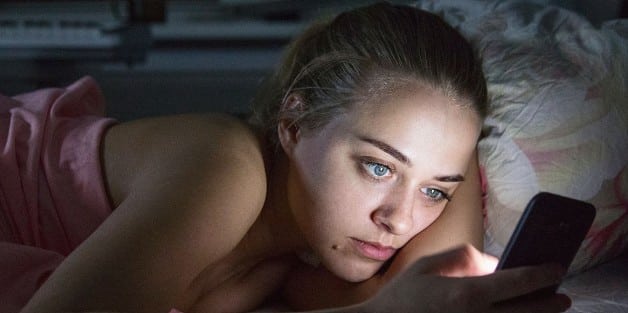By Adam Felman Updated on April 8, 2025
Medically Reviewed by Abhinav Singh, MD
Our smartphones, computer screens, televisions, the fluorescent lights in the office, and the sun all emit blue light. And experts want you to know that yes, exposure to blue light does affect sleep.
Read on to learn how blue light impacts sleep, how blue light therapy can treat sleep disorders, and what you can do to optimize your blue light exposure and improve your sleep quality.
What Is Blue Light?
Blue light is part of the spectrum of light the human eye can see and has the second shortest wavelength (after indigo and violet) and most energy. Colors on the other end of the light spectrum — red and orange, for example — have longer wavelengths and less energy. Light in this frequency range makes up around one-third of all visible light.
[1]The most significant sources of blue light exposure on Earth are the sun’s rays. However, electronic screens, such as those on televisions, smartphones, tablets, computers, and e-readers, also emit blue light, as do light-emitting diode (LED) lights and fluorescent light bulbs.
How Does Blue Light Affect the Brain and Body Clock?
Blue light has a direct impact on our brains and body clocks.[2]
Blue light from the sun, for instance, helps keep our circadian rhythm on schedule (aligned).[1]
Circadian rhythms are the changes to behavior and physical and mental function that an organism goes through in roughly a 24-hour cycle. The most crucial factors in controlling circadian rhythms are light and dark, but your sleep cycle, appetite, digestion, body temperature, and hormone levels all play critical roles. [3]
Part of the brain called the hypothalamus keeps your circadian rhythm in sync, especially a small cluster of cells called the suprachiasmatic nucleus (SCN). [4]
Is Blue Light Making Your Sleep Worse?
The brain doesn’t distinguish between blue light from the sun and blue light from sources like our cellphones and laptops, so blue light at bedtime can signal to the brain that it’s time to be awake.
“It essentially tricks the brain into thinking it’s daytime in the evening and suppresses the mechanisms that promote sleep,” says Phillip Yuhas, PhD, an assistant professor at the Ohio State University College of Optometry in Columbus.
Research from the past decade suggests that exposure to artificial blue light in the evening tends to make sleep worse.
For instance, a study published in 2014 found that people who read e-books before bedtime were more tired the next day compared with people who read traditional books. Those who looked at e-readers had shorter rapid eye movement (REM) sleep, a deeper sleep state when key brain regions consolidate memory.[5]
Dr. Yuhas recognizes that e-books have come a long way since this study. Many more now offer “night shade modes” that research has shown may reduce short-wavelength light like blue light. While clinical trials need to replicate these findings, the evidence suggests that screen-dimming can relieve but not fully prevent sleep disruption.[6]
“I still believe that the best option for patients is no screens before bed, however,” Yuhas says.
CLICK here to continue reading from @EverydayHealth



